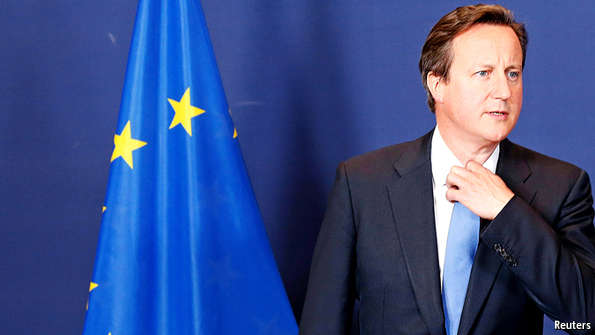by Biodun Iginla, The Economist Intelligence Unit, London
Sweat the big stuff
Winning a referendum to keep Britain in Europe should be the start of reform, not the end

The referendum is winnable. Over the next year or so Mr Cameron and his chancellor, George Osborne, can probably extract enough from their partners to persuade Britons to vote to stay in. Yet that victory must be just a first step. The real agenda—the one that matters to Britain’s prosperity and to the EU as a whole—will take longer to bear fruit. It will also demand a more sustained effort than Mr Cameron has so far shown.
As the economy and Scottish secession threatened to wreck Mr Cameron’s first term, so Europe looms over his second. No issue riles his party like the EU, on which opinions range from sceptical to head-bangingly furious. If Britain votes to leave the union, it will also end up outside the European Economic Area, the world’s largest trade bloc, which is governed by EU-set rules: a country which concludes that EU membership is an unreasonable infringement of its sovereignty would surely balk at taking orders from the club it has just voted to leave. Foreign investors would put their money elsewhere. Scotland might well vote to break away from the United Kingdom.
Time to talk dindon
Much energy will be expended telling Mr Cameron how to win the
referendum. Tactics change, but even now it makes little sense for him
to wait until 2017. By then Britain’s government may well be in a
mid-term funk, and both France and Germany will be holding elections and
less likely to give ground. Besides, a long period of uncertainty would
be bad for business. The prime minister should also stop promising to
amend the EU’s treaties before 2017, as though this were a yardstick for
measuring his seriousness: there is neither the time for that nor the
willingness in Europe to enter into what would be an arduous procedure.
He could limit himself to scoring some populist victories, such as
limiting immigrants’ access to welfare and making it clear that the EU’s
formal commitment to “ever-closer union” does not apply to Britain.Yet, even if they sway a few voters, such changes are ultimately trivial. And the problem with trying to deal with populist gripes is that another one is always just around the corner. The Tory party has been plagued by divisions on Europe for decades. Partly because of that, Britain has recently failed to get the best deal for itself in Brussels. Mr Cameron should really be aiming beyond the referendum, to long-term reforms that would benefit the EU as well as its most irascible member.
That larger task entails work on three things. First is the single market. The bosses of Britain’s successful services firms complain of obstructions on the continent. Only 37% of British services exports go to the EU, compared with 49% of goods exports; as the economy tilts towards services, the EU seems less worthwhile. Completing the single market in services will take longer than a year or two. But it is vital to set the direction of travel. Others expect Britain to lead on this and would welcome its efforts: Britain largely created the single market, back when it was seen not as too detached but as too influential.
In the same vein, Mr Cameron should back the efforts of Frans Timmermans, the vice-president of the European Commission, who is working to cut business regulations and transfer powers to national parliaments. By the time of the referendum, Mr Cameron ought to be able to claim some successes. If he continues after it, he could chalk up many more.
And all European leaders, Mr Cameron included, need to answer the question of how the EU will function now that most of its members, but not Britain and eight others, share a currency. Ways must be found to prevent caucusing—the stitch-up of negotiations in advance by euro-zone economies which have enough votes to force through decisions without the say of non-euro countries: a recipe for the EU’s break-up. Europe’s banking union shows that the euro zone can come up with institutions that do not threaten other countries. Now, before caucusing has begun, is the best time to find rules that prevent it.
Mr Cameron can get things done in Europe. His surprise election victory makes him seem stronger: at the least, other leaders know they must deal with this glossy Englishman and his referendum. It also makes him more resilient against domestic political attack (for a bit, anyway).
But his success also depends upon an inconvenient fact. More single market requires much more EU regulation. And Britain can only extend the market if it becomes a fully committed partner of the club rather than an absentee member.

No comments:
Post a Comment